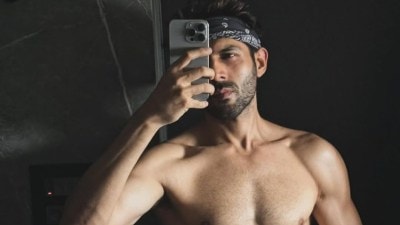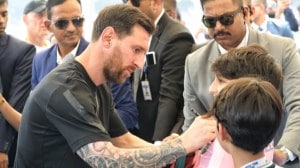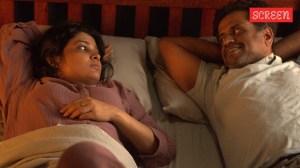‘You have physical age and mental age … I don’t feel fatigued when I am working’
Dev saab ... You have been described as ageless and the youngest man in Indian cinema, certainly the youngest friend I have ... We have to...

Dev saab … You have been described as ageless and the youngest man in Indian cinema, certainly the youngest friend I have …
We have to switch places. You start directing and I’ll start writing editorials.
That’s a problem dealing with you. You could threaten anybody …
Great, great being with you.
… You pack so much creative punch.
I think so. I think motion picture making is one of the most creative things. You get hold of an idea, you start developing it, you start
elaborating on it, you start doing a screenplay, then you start searching all over the world, looking for the cast, either the stars or the newcomers, then instructing the music director and then the songs and then start picturising. And then you take the world along with you and the world passes its judgement in one second. Good, bad or indifferent.
But that should not deter you. Because if the film is good they’ll throw bouquets, if the film is not liked by them, it doesn’t matter, proceed
further, do something else.
Dev saab, the other thing about cinema is that the glory goes away very fast. The glory goes away, the attractiveness goes away.
Because the present fades away.
Creativity goes away.
No.
So how does someone like you manage to keep it going for six decades?
Because, I think the birth of a new idea is like a new tomorrow. Past is gone by, you’ve got to forget it. Past fades away, you can’t hang on to the past. When you hang on to the past, it’s for the historians to do it, who write about it. When you are creating, you are writing about life, you are writing about incidents, you are writing about characters, you are writing
about certain themes that charge you, that excite you at motion pictures.
You are in the eternal process of creating all the time. And this eternal process of creating is the excitement. And that excitement is what you live for, and you are alive all the time. You are never, never, never dead.
Dev saab, you’ve now romanced four generations of Indian women. You have
dealt with four generations of Indian film personalities, in various states.
Yes, I think it’s a great feeling. I know my country inside out. I have seen the era of the late 1940s as a star, of the ’50s, of the ’60s, ’70s, ’80s, ’90s and into the 21st century … I am with the times all the time.
But your glory years were the ’60s and ’70s.
Glory is all the time, as long as I am functioning. Who knows, tomorrow
I may make something that people say, My God, this is the most outstanding thing that’s ever been done.’
But tell me the high point according to you in your life and career.
I think it was Guide. Guide because it was done as a collaboration deal between me and the late Pearl S. Buck, the Nobel laureate who wrote The Good Earth. And she was a great personality in those days.
It was shot in English. And that took me to Hollywood and it took me to America.
That’s not something that’s very well known, that Guide was first shot in English.
Because it didn’t do well. We had to change the English Guide to suit the temperament and the concept and the sanskriti of the Indian audiences. It had to be changed.
Did it change R.K. Narayan’s story?
No, we had sought permission, he had allowed us. If he had done the same book in Hindi, he would have flopped. Because the adultery angle was revolutionary. And people were scared.
Adultery meaning a married Waheeda Rehman falling in love with this guide, who was partly good for nothing.
And the I&B minister said the movie may not be passed because of adultery. Who was the minister at that time?
I think Mr Satyanarayan Sinha or somebody like him. And he said Dev saab, what shall we do? And I said I do not know. It’s a book which has been acclaimed and we have justified the angle. It’s up to you. Why shouldn’t the audience see what they should see? What are you hiding?
There is nothing to hide in a motion picture. Everyday living is what is shown in the movies.
So Dev saab, what did you change in the script finally?
The whole movie was changed, re-shot right from the scratch. I think the whole concept, the justification of the angle of this man falling in love with a married woman and why he did it. And how he did it. And he should have done the right thing. This is what the audience felt. And the spiritual … he goes to spiritual heights in the end, which is very difficult for the audience to digest. Our picture was not being sold. People said it is going to be a flop, because Dev having a romantic image he suddenly becomes a sadhu and he dies in the end.
And he ends up in a village which is hit by drought.
Yes.
But, let me go back to the adultery angle. What did you change? Did you do something to particularly justify adultery for Waheeda Rehman?
If you see the film, people were happy. This is what the whole screenplay of the Hindi version was. I think it was a great screenplay my
brother did. Vijay Anand, he did a grand job. It was one of the most challenging things to do.
So how did you create the justification for her?
I think it’s the way you develop the screenplay. You lead the audience on to a certain way of thought … That’s what screenplay is all about. You can justify anything. You commit a murder and you want to justify it, you start doing the scenes accordingly. You can all do it.
And this guide, meanwhile, becomes greedy and then goes to jail. And in the end turns to spirituality.
And a negative character. I have done a lot of negative characters and people have all said, why the hell have you done negative characters? I said negative characters are much more interesting than goody-goody heroes, because they give you a lot of scope for performances. After all you are only performing. It doesn’t mean that you become a villain.
And you landed up in a village that was actually drought-hit?
We shot it in Limbdi, we shot it in Rajasthan, we shot it all over. And it was one of the most, most satisfying experiences. Very gratifying.
And I believe, in the original, as the guide sits there on a fast unto death, waiting for the rains, in the original book rains don’t come. But in the movie …
He dies.
He dies a failure.
He dies a failure. He says The sky … I can see the rains coming, the rains are coming and the rains are coming.’ And the camera goes to the skies and the sky’s blue … satire. But in the Hindi version, it’s the faith. He says if these people have faith in me, then I think I have to rise to the occasion.
And there is a conflict inside him between the good and the evil. It so happens, he dies. He’s a human being. But as he dies the rains fall, and people are jumping with joy. It’s a great ending, a great ending …
And this actually was a drought-hit village. Your crowds were for real.
Yes. Because we went to Limbdi and people in hundreds and thousands would come from miles and miles and miles away in trucks, on bicycles and motor cars.
Believing that a real sadhu has come.
Travelling all the way, touching my feet, thinking that he’s a real sadhu. This is India. India’s a hell of an emotional country. It’s so easy to believe in this country because people are emotional, they are sentimental and there is a peculiar spirituality among the people of our country.
And this was a village in Gujarat.
Yes, in Gujarat. Limbdi. The bed of the river called Baramati … It’s not Baramati …
Sabarmati, maybe.
Sabarmati, and this is where Gandhi’s fast used to take place, if you remember.
It was dry?
It was dry, very dry and we used to be sitting, and squatting on charpoys on the bed of the river and thousands and thousands of people congregating everyday to have a darshan of this man who was just an actor, who was performing, sort of as a real swami. But it gave him a real image.
But I believe it’s from Guide that you picked up what you think is the guiding principle of your life.
I think it’s great, because if that principle belongs to people when
they start maturing, it’s something which is …
And Dev saab, what is the principle?
I don’t very often remember my lines, but I think he said something like this. He said …
This is when he’s dying?
Yeah, yeah … There is a conflict between the good and the evil and before he dies, he says: Zindagi ek khayal hai, jaise ke maut ek khayal hai. Very nice. It’s a thought. Zindagi ek khayal hai, jaise ke maut ek khayal hai. Na sukh hai, na dukh hai, na deen hai, na duniya. Na insaan, na bhagwan, sirf main, main, main, main. So, the supremacy of the self within you is your God.
This is what Gita says. This is what Hindu philosophy says. This is what spiritualism is all about. And I think at this stage of my life I am immune to sorrows, I am immune to my great moments of joy.
But the fact is Dev saab that many of your films actually skirted very close to reality. Unlike most films in your times which were in the world of make-belief, big romances, melodrama.
No, listen to me. You pick up a fact of life, you’ve got to dramatise it. A fact of life may not be that interesting … You’ve got to take it to larger-than-life dimensions.
I remember Tere Mere Sapne was about doctors in a village …
… Larger-than-life dimensions, this is what cinema is all about.
Something is happening, it passes muster, nobody bothers. But when you focus on this and start dramatising it, it becomes the only thing in the world.
This is what cinema is all about. You focus things.
So can you turn the life of an acquantaince, or somebody you meet, into an interesting film?
If it charges me. If the life charges me. If the incidents of their life, they say something to me: Look it’s a great theme, enlarge upon it.’
And I’ll do that. Even an ordinary man can be very dramatic.
Give me an example.
For instance in Hare Rama, Hare Krishna. I saw an Indian girl sitting on the lap of 15 long-haired dirty-looking hippies. In the lap of a foreigner and by the light of a candle, the guitar is playing and she is
probably making love to him. It’s 11’o clock at night. And a German friend of mine, he was a documentary maker in Nepal, took me there and my eyes immediately went on to this girl’s brown colour. I said, this girl is Indian. I got intrigued.
I followed the girl. Next day, I asked the Soaltee people, I said that I want to meet this girl. And they said yes, you’ll meet her. And the girl came, she got to know I was Dev Anand. She came to see me. I asked her about her life and she told me what she was in the picture.
And I got so charged, when I went to the late King Mahendra to thank him for his hospitality, he asked me, What else can I do for you?’ I said I want to make a picture that can only be shot in Nepal. He said what is that. I said its about hippies because it’s very rampant here. He said Go and do it.’ I said will you give me all the facilities. He said yes, and he gave me an inspector.
I went to Pokhra and I did the first version of the script in three days.
And that’s a fact. Because when you are charged you are just at it. Then nothing happens to you, except you are writing, you are focused, you are writing, you are focused. This is how things grow.
Beauty Queen is on beauty pageants. Song of Life is on something that happened. I was to leave for Bombay and I got to know that this Norah Jones has won an award. And there was a press release …
This is the Ravi Shankar-Norah Jones controversy?
It’s not their story. It was revealed the next morning that she happened to be the daughter of an American girlfriend of Ravi Shankar. No more after that. I do not want the great musician’s life, because he’s too great. If I
want to portray his life, I’ll go and ask him. Similarly Norah Jones. But …
So how will you get around that problem now? Just replace the sitar with a guitar or something?
No. Look sitar is also an instrument like guitar is an instrument. Piano is also an instrument. And there are musicians and musicians all over the world. There’s Vilayat Ali Khan who plays the sitar, there’s Imrat Khan who plays the sitar. He need not be a sitarist. There’s Mozart, you have A.R. Rehman and you have great musicals running on West End. So to say it’s my life is wrong, because music is music. It can belong to anybody.
So can you make a film on anybody’s life like that?
Anybody’s life. And that is a challenge of a writer. You can write anything. It’s like writing a novel.
Make a film on my life?
I can. I met you for the first time on an Air-India flight and we looked at each other, we recognised each other. I half-nodded, you also
half-nodded, you walked up to my seat and you were wearing a cap like this and you said, I am Shekhar Gupta.’
And I kept looking at you, because, I have read your editorials and I am a great fan of yours. You said you were a fan of mine. And I thought to myself, My God, if he’s a fan of mine, I am doubly his fan.’ This is a fact.
And then you also hinted that probably I am being tipped to go to Pakistan.
And I went to Pakistan, with Atal Behari Vajpayee and I got very, very friendly with Nawaz Sharief. And I told him that I am here in this city which belongs to me because I was in Lahore Government College. Would you mind if I made a picture here? No, he said, go ahead, make a picture.
In fact, you took away the cameras from the two prime ministers. They were all chasing after you.
Exactly. I was toying with the idea, then he was ousted. But there’s nothing to stop me now to make a picture there, because Musharraf is there.
Can’t I go and meet Musharraf? I am a world citizen. I can go and tell him look it’s a great subject, there’s no propaganda, there’s no sloganising, its on a human level. Let me make a film.
So, is that one big ambition you have, make a film in Pakistan?
One of the ambitions. It could be, could be something else, but whenever I go to places, I think in terms of cinema. I have a tremendous cinema eye, for visuals, which has developed over the years …
Lot of people say why don’t you go to Parliament. I say it’s not my field. I am growing in my field.
In fact, Nawaz Sharief once asked me, he was very curious about you and he asked me in Punjabi. Does Dev Anand walk around? I asked him what do you mean? He said, he must be very old. I said, you haven’t seen him. You can’t catch up with him.
You have physical age and mental age and age of the mind. I don’t feel fatigued when I am working. Of course, I am that mature and I have grown. I call it I am grown. I don’t say I am aged. I am grown. I am moving, moving forward.
But you know in the process of the growing and evolving you have romanced four generations of Indian women. Give me the Dev Anand take on
Indian beauty. Rank your heroines on a scale of 10.
Listen to me, you cannot define beauty. Suddenly some girl comes running towards you and your mind says stop for a second, give a pause. Ahh, she’s a good looker. How can you define it? She could be having good, beautiful eyes, a beautiful smile, beautiful face, beautiful innocence, the way she carries herself, the way she speaks. So, beauty lies in the eyes of the beholder. I have worked with almost all the girls and I think they have romanced with me on the screen. Woh sirf duniya ke premikayen thi, aur duniya jab dekhti ki hamari bahon mein aa gayeen, to hum …
But they are all different, for example, say Suraiyya, Madhubala …
Each one. Like person to person.
So, on a scale of 10, who’s the tops for you? Now, speak the truth.
No, listen to me. All top stars, Madhubala was pretty, so was Suraiyya, so was Nutan, so was Hema Malini and the girls that I have introduced myself.
Like Zeenat Aman?
I go by my character. I don’t go by face. I say this is my character in the script and I want … I close my eyes and say these are the traits that I visualise in this character and I look for those characters. They are there sometimes, and sometimes we have got to weave them in the script and you compromise.
But tell me, what was peculiar with each one? Tell me what was interesting about Madhubala that was different from others? I believe she giggled a lot.
Madhubala was a great giggler. Jab hasti thi to hasti chali jati thi. Shooting ko thoda rokna padta tha.
Unstoppable.
Hamara make-up room jo tha na, beech mein wooden partition hua karta tha. To main jab make-up karta tha ek ore, to woh aati thi apne kamre mein, to pehle to uski khat-khatahat aati thi, phir uski hansi aati thi, aur hansi ka matlab hai hello’. I would say hello and she would say hello, main aa gayi.
They all have their own characteristics. And they are all good innocent,good-looking girls, good face…
And Suraiyya was your favourite for a long time.
Very good singer, beautiful eyes, muskarati thi, man hi man hans deti thi, aur poochte the kyon hans rahi ho, to khil-khila ke hans padti thi.
But she was a bit more, a bit more than just your leading lady.
Because she was a big star when I had joined. I was absolutely new. When I first met her, I was floored. I said I am meeting Suraiyya, the great singing star of those days.
There were stories about you hanging around outside her house, a great romance at that time.
It happens to everybody. I fell in love with somebody who was most probably my calf-love. It could happen to you.
It was a romance, much more than a calf-love?
Yes, it was a romance. I proposed to her. There’s no shame involved in that. Every young man does it.
No, why should there be any shame involved in that.
That’s what I am saying. I think it was a phase which I got over and maybe for the better because today I am what I am because I have gone
through a certain phase which is …
But did you fall in love with more heroines after that?
On the screen yes, everytime.
Off the screen?
Off the screen … everybody falls in love.
Lots of Indian women fell in love with you …
Who doesn’t fall in love?
The other thing about your career has been great music. You and S.D. Burman and then you and R.D Burman and in fact with Kishore Kumar. You produced great music. Tell me your favourites of all time.
Shekhar, paintis picturon main…
I’ll tell you mine: Main fikr to dhuyen mein udata chala gaya with a lighter.
That gave me certain philosophy also. And it was written by Sahir Ludhianvi. Main zindagi ka saath nibhata chala gaya, aur har fikr ko dhuyen mein udata chala gaya. I think it’s a good philosophy. I have lived by it. People have associated me with that kind of a temperament.
I think it’s a great temperament, because in the movies especially and in politics there are ups and downs and fluctuations and vicissitudes of life. You are up, you are down, you are debris, you can go up. So this is a good philosophy. You should sustain yourself.
Tell me some of the other ones that are your favourites.
One song that I have always loved and everytime I meet Lata I tell her it’s one of her best sung songs is Rangeela re, which S.D. Burman composed for Prem Pujari. And Shokhiyon mein ghola jaaye done by Kishore Kumar.
That was written by Neeraj?
Neeraj. Neeraj has written some good songs. Sahir Ludhianvi wrote some fantastic songs. Shailendra wrote some beautiful songs …
And of the songs picturised on you which are your favourites?
Gaata rahe mera dil is a good song, then song Kaanchi re, kaanchi re in Hare Rama, Hare Krishna with me and Mumtaz in Kathmandu is a good song. There are so many of them …
Dev saab, what are the frontiers left to conquer? You said you want to make a film in Pakistan. What else is left to conquer for you? What else is it that you want to do?
It’s not just Pakistan. Frontiers are all the time. There are millions and millions of frontiers, which one I pick up all of a sudden depends on that moment. Because, you see, this is a type of creation. You are suddenly going on a street or sitting in a restaurant, reading a newspaper and might get hung on to a thought, My God, this is the greatest film I’ll ever make.’
It’s not just Pakistan. It could be one of the projects, if at all it happens. Otherwise I have a lot of great projects on my mind and life is
short and art is long.
And what keeps you going at this age? This is the age when most people decide to either take it easy or become spiritual.
My own, my own inner excitement. With my thoughts, with my process of thinking. I am writing also. It’s a hell of a span of writing, starting from 1943, I came to Bombay at 19 and still I am hoping to write now for my future projects. It’s a span of 50-60 years which I want to tell the world.
Dev saab, you know by your age, actor for 30 years, for 40 years, like Ashok Kumar, you should have been acting as a character actor. We have never seen you do a cameo or a character role.
I didn’t have to. No, why? Why now? I’d rather be known as what I did in my last picture. I don’t have to do a stupid, insignificant character. But if it’s a great character role, that carries the picture on its shoulders, and something of a challenge to me as an actor, I would certainly love to do it. Who wouldn’t? …
But insignificant roles, aa ke chale gaye paisa banane ke liye, I don’t need that type of money, I don’t need that type of work.
But what has changed in today’s cinema? In your times, the stars were much more natural. Today everything seems manufactured. There are
orthodontists and there are cosmetic surgeons.
I think they are lucky because if a girl doesn’t have good eyes, she puts contact lenses. If she doesn’t have good hair, there are hair …
Is it a good thing or a bad thing?
In show business, is a good thing, because show business is glamorous.
And they have all the gadgets, they have an access to the world.
But there’s the speculation. Did you try to do something similar? Did you ever seek help from a surgeon?
No, no, I have not done it so far. No, you should be as you are. People should accept you as you are. They know my age …
Dev saab, tell me who invented your style? Your scarf, your big collars, your cap?
Myself. I suddenly must have realised I look good in this and I started cultivating it. I make my own designs.
You design your own clothes?
When I have a role given to me, I close my eyes and envision myself in that role … the physical garb I should be in. And I plan my own costumes,
I get my own tailor, because if I go to any fashion designer … fashion designers are fashion designers, you are a slave to them, and your personality should not become a slave to somebody else, who is a non-entity.
So what is it that you see is wrong with today’s cinema?
Nothing’s wrong. Everything is good. They are making some good pictures.
You are breaking, going into the international market. You are making good pictures, you are making outstanding motion pictures, you are making bad pictures, you are making average pictures, it’s happening all over the world.
So, we see Dev saab also now producing a few of his own in this genre, maybe starting with your, I won’t say the Norah Jones film, but your sitar film.
Yeah. Song of Life is a film you should look forward to. It’s an American musical on the lines of their musicals. Strong music directors, strong composers, good casting, I am directing and also acting in it. And then for my home market, my office is waiting for it. Beauty Queen … but these are the projects that keep me going and by the time they are on on the sets, something else will happen.
Dev saab, carry on forever, keep on getting younger and younger. All of us look to you for inspiration.
I think it’s the profession that makes you feel young.
No, it’s the attitude.
Maybe. It’s the same thing.
- 01
- 02
- 03
- 04
- 05































